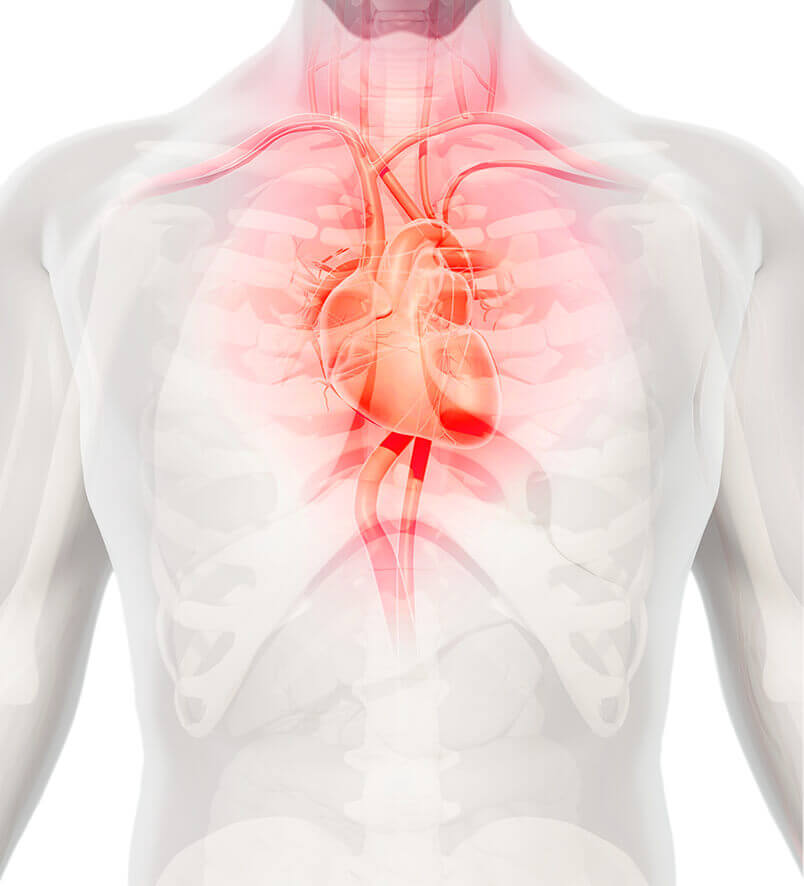Correlations between periodontitis and cardiovascular disease
In Germany alone, cardiovascular disease continues to be the leading cause of death. Around 40 percent of all deaths are due to cardiovascular disease. However, the biggest risk factors are no longer just high blood pressure, lipometabolic disorders or unhealthy lifestyles characterized by nicotine, alcohol or obesity. The latest research findings identify periodontal disease, the bacterial inflammation of the tooth bed, as another serious source of danger that can cause diseases such as heart attacks and strokes, as well as having a negative impact on their progression. Current studies assume that periodontitis patients are up to 1.7 times more susceptible to cardiovascular diseases. The risk factor for periodontal disease is often even equal to that of typical risk factors such as high blood pressure, morbid obesity and above-average blood lipid levels.
What is periodontitis?
Periodontitis, also known as periodontal disease, is an inflammation of the gums caused by bacterial plaque. If the inflammation remains untreated, it can destroy the periodontium in the long term and lead to tooth loss. In the initial stages, the patient hardly notices any symptoms. However, as the inflammation progresses, the gums recede, exposing the tooth necks and making the teeth appear longer. Other symptoms include sensitive teeth and bleeding gums. The triggers of periodontal disease are varied. The disease is often caused by poor oral and dental hygiene, a weakened immune system, metabolic disorders such as diabetes mellitus or excessive nicotine consumption. During treatment, the dentist removes the inflamed tissue, cleans the oral cavity, disinfects the gum pockets and, if necessary, smoothes the tooth surface. Antibiotic therapy is recommended for stubborn forms.
Periodontal disease and cardiovascular diseases - Chronic inflammation
As a rule, periodontal disease is limited locally to the oral cavity. However, it often spreads and leads to serious complications. Just as the bacterial disease causes chronic inflammation in the oral cavity, it also causes inflammation in other parts of the body. Inflammation-promoting messenger substances from recessed gum pockets (Porphyromonas gingivalis), a typical side effect of chronic untreated periodontitis, can penetrate other areas via the bloodstream and, in the worst case, settle in the entire body. This is known as bacteremia. Particularly aggressive foci of inflammation can gain direct access to the inner walls of the body's blood vessels, causing chronic inflammation and permanently changing them. They pave the way for arterial occlusive diseases such as strokes or heart attacks, the main causes of which include inflammatory changes to the inner walls of the blood vessels. The oral bacteria trigger an inflammatory reaction, the vessels swell and the blood flow slows down. Less oxygen reaches the blood vessels and the risk of a heart attack increases.
Periodontal disease and platelets - risk of clumping
According to current scientific studies, Porphyromonas gingivalis also promotes the clumping of platelets, the smallest cells in the blood. They are responsible for hemostasis, blood clotting and combating blood clots. As soon as a vascular injury occurs in the body, the platelets come into action. In order to completely fill the vascular leak and thus stop the bleeding, the platelets join together and stick the lesion together. However, if Porphyromonas gingivalis increases the clumping, platelets can block vital arteries, cause blood congestion and, in the worst case, lead to death.
Periodontal disease and atheromatous plaques
In addition to chronic inflammation and an increased risk of clotting in platelets, oral bacteria are also thought to stimulate the formation of atheromatous plaques, pathological deposits of fats, necrosis and cellular debris in the vessel walls. The atheromas detach from the wall layer of the artery and cause a so-called aero-embolism, which constricts vital vessels to such an extent that the oxygen supply to the respective organ is reduced. The patient may suffer a heart attack.
Periodontal disease and cardiovascular disease - a long scientific tradition
The link between periodontal disease and cardiovascular disease is often dismissed as a myth. However, scientific findings support a correlation. As early as 1989, a Finnish working group attempted to link periodontal and cardiovascular diseases. The observations: In patients with acute myocardial infarction or stroke, oral health was noticeably worse than in corresponding control groups. A similar study confirms this trend. 1,147 people were followed over a period of 18 years. The result is clear: severe periodontal disease increases the risk of coronary heart disease by a factor of 1.5. In the case of fatal heart disease, the risk increased to 1.9, and in the case of stroke, the risk even rose to 2.8. However, absolute claims cannot be made on the basis of these scientific findings. The actual connection between periodontal disease and the risk of cardiovascular disorders requires further investigation. The University of Greifswald is currently conducting an epidemiological study in Western Pomerania with 7,000 test subjects on oral health and its effects on cardiovascular diseases.
